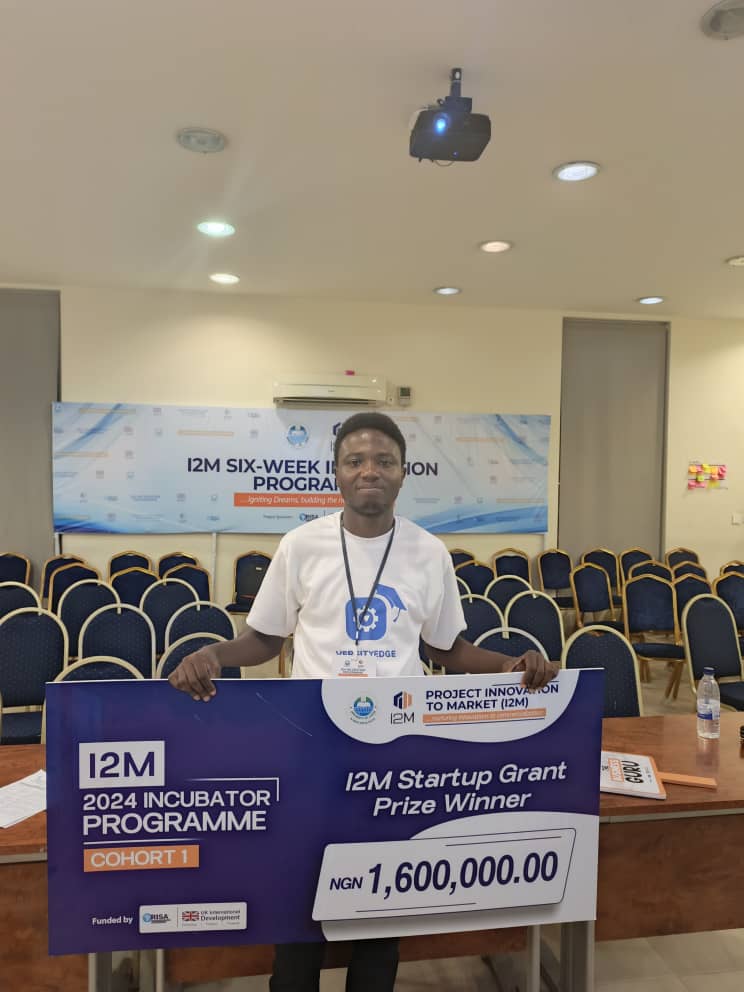Tales of Leadership (02): An Interview with the 2K27 Majority Leader

This interview is the second of the Tales of Leadership series. In the first, we heard about the experiences and lessons learnt so far from the majority leader of the 100-level class, Mr Olajide Abimboye. In this, we interviewed Mr Femi Ogundeyi, a two-term majority leader of the 200-level class. Speaking with the press, he revealed what it is like to handle the most participatory class in UIMSA, offering insights from the lessons he has learnt so far from previous leadership positions and the one he currently holds. He also mentioned how much his classmates’ gift of a sum of two hundred thousand naira meant to him. Enjoy!
Q: Can you introduce yourself and your class, please?
Femi: My name is Femi Ogundeyi, and I’m the Majority Leader of the 200-level class [the 2k27 class].
Q: Are you a first-time Majority Leader?
Femi: No, I am not.
Q: How many tenures have you served for, then?
Femi: Well, we are now in 200-level, so this is just my second tenure.
Q: What led you to contest for the role?
Femi: My initial plan was not to get involved in any class matter. I had actually been a Uite for a while. I got admission into some other courses in UI before MBBS, and in the last one before MBBS [Nursing], I was the class rep. We had about sixty members, and it was very stressful and demanding. So after Nursing, I told myself I wasn’t going to get involved in class leadership again. But while waiting for the cut-off before resumption, there were lots of interactions on the group. I felt there was a need to step up because I saw the way things were going and I knew that if nobody did, it could have become chaotic. Since I had done something similar before, even if on a smaller scale, I felt it was a call to step up. Initially, it started as coordinating one or two things on the group before I became an actual rep. Eventually, I contested, and I won. That’s the short story.
Q: That’s quite impressive, noticing that you were fit enough for a role and being brave enough to go for it. Since you decided to contest, what was the election process like for you?
Femi: For me, in 100-level, the election process wasn’t stressful. It was online. Even before the election, I had reached out to people to introduce myself and share my plans. When the campaign started, it was mostly online, which made it easier to reach out. Eventually, I won. Honestly, I didn’t think I would. I wasn’t used to talking to people like that, so I felt I was too quiet for anyone to notice me. But I just gave it my best, and it worked out.
Q: How was your class name chosen?
Femi: After the election, that same week we sent out a form for people to suggest names. We got about thirty suggestions, screened them down to four or five, and sent them out for voting. “Eximius” got the highest votes. Interestingly, I actually suggested the name. When the class voted, it was chosen, and that’s how it came to be.
Q: You said it’s not your first time as Majority Leader. Why did you reapply this tenure?
Femi: After 100-level, it was a long tenure that extended into 200-level. When we resumed preclinicals, I wasn’t sure I wanted to continue because I knew it would be more demanding. I had a lot to focus on. But towards the end of the tenure, I decided to try again and see how far I could work with the class.
Q: How has leading your classmates challenged you?
Femi: Leadership is not just about the position; it’s about the people, and that has guided my approach. While it has been demanding, I’ve been able to put structures in place to make it easier. The challenge is in resolving issues, coordinating activities, and ensuring no one is left behind. That takes foresight—looking ahead at possible problems and finding solutions before they come up. That way, when challenges do arise, it’s easier to resolve them.
Q: What methods have you put in place to ensure smooth running of class activities?
Femi: One thing I did was set up committees. Each committee focuses on a particular aspect of class life. Delegating duties this way makes coordination easier and more effective, instead of me doing everything alone.
Q: Which is more challenging between academics and leadership?
Femi: Leadership. With academics, I know what to read and study. There’s a guide. But in leadership, you’re dealing with different individuals, each peculiar, and there’s no manual. You have to figure things out as they come, and that’s more challenging.
Q: How do you balance leadership with your personal life?
Femi: I don’t see my life as fragmented. I’m not separately a student and a class leader. I integrate everything—class activities, academics, personal life—so none is neglected. Compartmentalization hasn’t worked for me, but integration has.
Q: A class is made up of people from different backgrounds, so conflicts will arise. How do you manage conflicts within the class?
Femi: Conflict is natural wherever people gather. I’ve tried to minimize it by helping my classmates see each other as family. We’re not just a class, we’re a family trying to survive medical school together. That mindset reduces friction. When conflicts do arise, I don’t act as a judge to decide who’s right or wrong. Instead, I focus on helping both parties manage the situation. That approach has worked well.
Q: Do your classmates see you more as a leader or a friend?
Femi: Both. Before I’m a leader, I’m one of them, a member of Eximius. I’ve tried to be approachable, so they can see me as a friend, not just the leader.
Q: How do you handle conflicts of interest between the class and lecturers?
Femi: Diplomacy is key. I always present class issues respectfully, in a way that doesn’t sound offensive but seeks understanding. So far, this approach has worked. I can’t recall any instance where a lecturer rejected what I presented.
Q: How about conflicts with other classes in UIMSA?
Femi: There are seven classes in UIMSA, and I only lead one. But I do have influence over how my class interacts with others. I remind my classmates that no class is in competition with another. We’re one association. That understanding has prevented major conflicts. If things get tense, I quickly intervene privately to calm things down.
Q: Has there been any situation that made you consider stepping down?
Femi: Not because of conflict with the class. But sometimes the workload gets overwhelming, and I’ve asked myself if I really wanted to keep doing this. Still, I’ve never considered stepping down due to class issues.
Q: Do your classmates have habits that stress you out?
Femi: Yes, but nothing peculiar to my class. Things like passing important information and some people still claiming they didn’t see it, or instructions not being followed. It happens everywhere.
Q: What has been the peak of your service to the class?
Femi: A few moments stand out. One was being named the Most Participatory Class in UIMSA. That took a lot of effort convincing my classmates to get involved. Another was after 100-level, when we recorded about 38 people with perfect GPAs. That was a proud moment, seeing that my classmates shared my vision and put in the work.
Q: How was it receiving that award at the UIMSA dinner?
Femi: It felt good, though it wasn’t unexpected. I had seen the possibility throughout the tenure. Still, being recognized, especially as a first-year class, was a proud moment.
Q: Congratulations again. What has serving on the UIMSA Senate been like for you?
Femi: UIMSA Senate is a platform I’m grateful for. Before MBBS, I had been a class leader, but the Senate broadened my view. It showed me that politics and leadership go beyond coordinating a class. It’s about strategy, influence, and responsibility on a bigger scale.
Q: What opportunities have you gotten from being a Majority Leader?
Femi: One is access to lecturers and people who might otherwise be hard to reach. Another is that in some applications I’ve made, being a Majority Leader has given me an advantage. So while there’s no monetary reward, the access and recognition have been rewarding.
Q: What’s one memory you have made as Majority Leader that you won’t forget?
Femi: Last month, my class came together and raised ₦200,000 for me. It wasn’t the money itself but the fact that they saw me, valued me, and appreciated me. It was unexpected, and it really stood out for me.
Q: If you weren’t the Majority Leader, which of your classmates would you trust with the role?
Femi: I would recommend George Susan. I’ve worked with her and seen her capacity to lead. She has the qualities of a leader, and I trust she could do it well.
Q: Would you ever step down as Majority Leader?
Femi: This tenure ends in 2027. For now, I don’t see any reason to step down before then.
Q: After this tenure, what’s next for you?
Femi: I’ve never seen this role as political but as a call I responded to. I’ll still like to continue serving, maybe as a senator, ensuring my class is in safe hands. For now, I can’t say exactly what’s next until the tenure ends.
Q: Do you have any last words?
Femi: I’d like to thank the UIMSA Press for this opportunity. It made me reflect on the journey so far and what lies ahead. To Eximius, I want to say: we are a family. There is so much we can achieve if we stay together and move as one. Thank you for the opportunity to serve as your Majority Leader.





Great response there my leader. Weldone UIMSA PRESS.